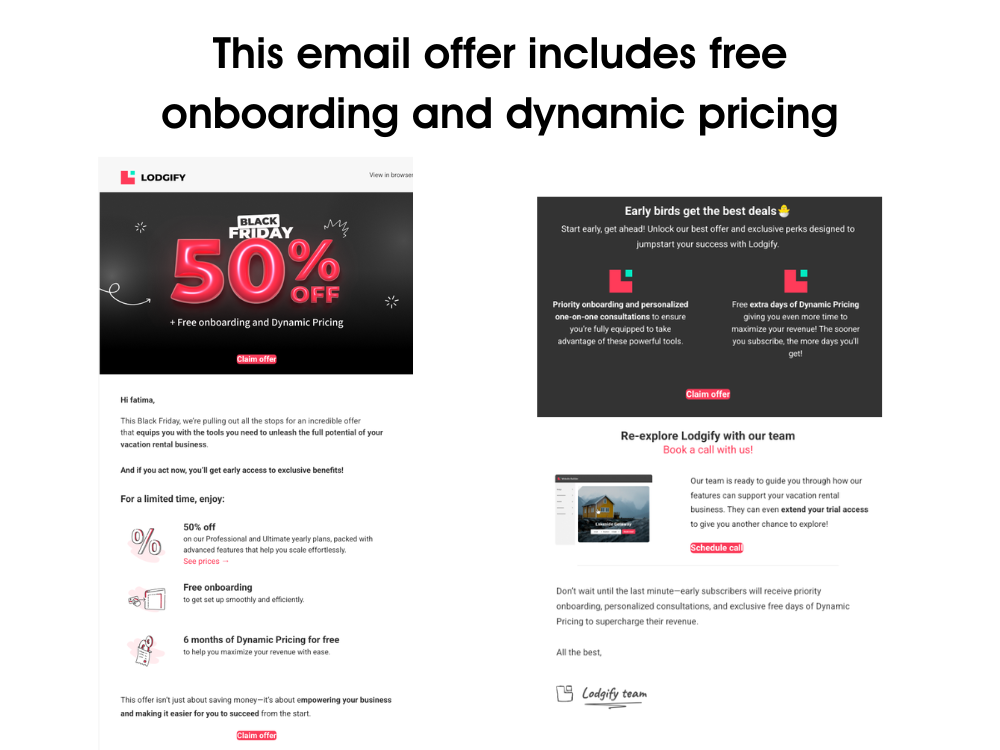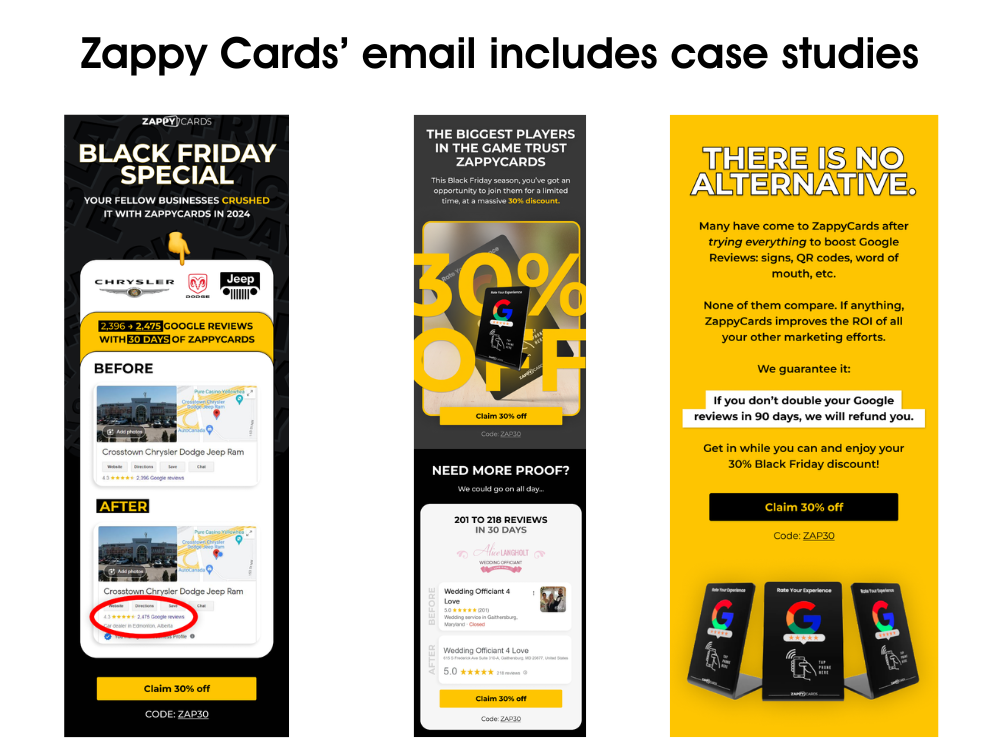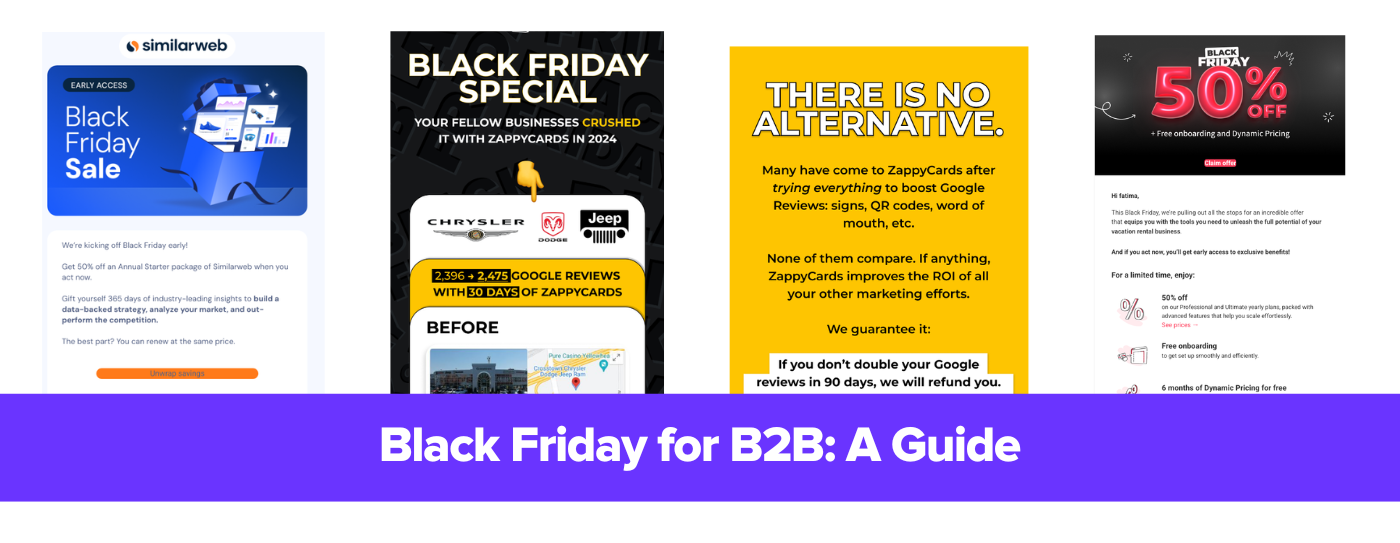The Black Friday shopping rush is not stopping anytime soon. Black Friday online sales reached a record $10.8 billion in 2024 with about 169 million shoppers participating the sales frenzy.
Black Friday is an opportune time for merchants because it's the most anticipated sales event of the year across industries.
Advertisers are now expected to start promotions way earlier than the traditional weeks before Black Friday, expanding into something new called Black Fall.
Basically, one day isn't enough anymore. Brands want to milk this opportunity as much as possible and catch all possible purchases before dribble in the lead up to the end of year events.

In 2024, U.S. holiday sales in November and December 2024 was expected to grow at a healthy 4.8% year over year and more than half of customers expect to maintain holiday spending.
Over a third of customers anticipate an increase in overall spending.
As a business owner or marketer, taking part in Black Friday is completely up to you.
For B2C companies, the answer is almost always an obvious “yes”. They have more than enough reasons to be happy about the season, and get the most out of it – customer reach, engagement, conversion…you name it.
If your company is in the B2B space, the answer isn't as cut and dry. Is there a way to benefit from the Black Friday and Cyber Monday fever?
What are the things you need to consider before deciding to embrace the holiday?
In this article, we'll explore whether Black Friday is suitable for B2B merchants and how B2B brands can take advantage of this spending spree. Keep on reading!
Should B2B merchants participate in Black Friday?
B2C merchants reap the most profits from Black Friday out of all their annual promotions but that doesn’t mean B2B brands can’t enjoy the same benefits.
After all, the B2B audience are consumers too. A great and limited time deal is appealing to nearly everyone.

That said, a business’ suitability for Black Friday promotions depends on the type of services they offer and their target customers.
We see the following categories as most apt for Black Friday:
- B2B brands whose customers are B2C merchants who participate in Black Friday
- Products with low complexity and lower cost
By complexity we mean how long the purchase journey is for the customer.
Complex B2B products entail a long process requiring approval from multiple stakeholders. Therefore, Black Friday is not ideal for these kinds of businesses.
In contrast, Black Friday deals are more relevant for B2B merchants with products that don’t require as many steps before purchase.
These tend to be simple and relatively more affordable products with shorter research periods and fewer stakeholders involved.
In particular, these industries are a great fit for Black Friday:
- Furniture and office equipment
- Clothing
- FMCG
- Consumable goods
- Software subscriptions and licences
- Cleaning supplies
- Wholesalers
It’s also interesting to note that a bulk of B2B buyers are millennials. This consumer segment has grown up with ecommerce and expects an ecommerce-like experience in their purchases, even for B2B products and services.
Millennials like other digital natives also prefer a quick buying journey, which makes limited-time deals aimed at them even more effective.

Which Black Friday deals should B2B businesses offer?
Price reductions work just as well for B2B merchants as they do for B2C. Make these offers available for a limited time only to increase urgency.
Black Friday deals are more relevant for B2B merchants with products that don’t require as many steps before purchase.
But this isn’t the only type of deal you can offer to your customers. Consider the following promotions:
- Discounts for VIPs (high-spending customers)
- Discounts for annual subscriptions
- Extended warranty
- A refund guarantee
- Dynamic pricing
- Free onboarding
- Free introductory call or consultation with your team
- Personalized product demo
- Exclusive invitation or early bird access to an upcoming event
- Exclusive content: Infographics, checklists, and other guides for Black Friday
- Donations to charitable organizations and other causes

Tips for Creating Black Friday Marketing Strategies for Your B2B Company
If you have decided that Black Friday is the right day for you (too), then here’s what should be done:
But first, congratulations because you’ve spotted a great opportunity for your business to hit the mark.

Give a pre-Black Friday offer (start earlier)
Creating anticipation is the first step towards making the most of the Black Friday season or the entirety of the holiday season.
You can capitalize on BFCM campaigns if you give your potential buyers sufficient time to consider your offer. Remember the B2B sales cycle is longer than B2C so it doesn't make sense to give promotions on the week or day of Black Friday, not matter how tempting those promotions may be.
Take for example the email below. Smart Marketer sends out a free resource that aims to prepare their customers for the upcoming Black Friday sale and to optimize Q4 promotional strategy. They sent this a whopping four months before Black Friday.

First they deliver value to their email list through a relevant guide and get engagement through this personalized email. The email gives a preview of their BFCM Toolkit, which is available for a limited time only. That is enough reason for a subscriber to click.
Season-pricing for B2B SaaS brands
Enterprise B2B SaaS providers have it slightly easier than traditional businesses and regular service providers since they can easily adjust seat-based pricing to reflect the discounts during the holiday season.
By making simple changes to pricing or rolling out discount offers during the holiday season, the seat-based pricing for your enterprise products is already taken into account during the consideration phase of a typical B2B customer.

Fortify and customize your website and landing pages
Running dedicated BFCM campaigns -- one-to-one, on calls or in meetings -- is fine.
You’d, however, do better to throw open the doors of your campaign to website visitors and dedicated landing pages assigned to other campaigns (such as social media ads, Google Ads, and more).
Stress test your website. Ensure that your offers take center stage, and roll out dedicated pop-ups and banners to make it possible for everyone visiting your website or landing pages to know more about your holiday promotions.
If you need inspiration to optimize your website and landing pages, it is also a great idea to check what others in the B2B sector are doing.
Keep engagement alive with email marketing
Email marketing and SMS (as a special note) helped ring in Black Friday and Cyber Monday sales with a total of 1.83 billion Black Friday emails sent to customers in 2023 (an increase of 13% over the year 2022).
Combine the total number of email marketing campaigns sent to account for Thanksgiving, Cyber Monday, and others and you have a whopping 3.1 billion emails sent.
Those emails didn’t land on dead inboxes either.
Email campaigns boasted 386.9 million opens and 12.72 million clicks, and email engagement has gone through the roof.

Given that your email list would have been populated by engaged decision-makers already, running a dedicated (and focused) newsletter much before you even think of promoting offers is a great idea.
The best part about email marketing is that it doesn’t differentiate between a B2C buyer and a B2B buyer (while the wording, copy, style, and content are drastically different).
Email marketing lets you take a calibrated and thoughtful approach as far as lead nurturing, lead qualification, and taking those precious further steps forward.
Give buyers preferred payment options
Most B2B buyers today are digital natives and so they expect a B2C-like shopping experience in B2B merchants, whether they are shopping online or in-store.
If your website is not built for this, make a shift to exclusive purpose-built B2B solutions which allows for personalized buying experiences for corporate buyers, custom pricing, personalized storefronts, flexible payment terms, self-serve portals, company account requests, sales rep permissions, bulk-ordering, easy re-ordering, and more.
A quick and convenient checkout process should be available to customers, especially during shopping spree to provide a seamless experience.
You too can make Black Friday work for your brand
Embracing Black Friday and Cyber Monday can significantly boost your B2B business, extending beyond simple discounts to strategic, long-term customer engagement.
By customizing offers, starting promotions early, optimizing your online presence, and using email marketing, you can capture the holiday spending surge.
To discover how leading B2B brands are capitalizing on these opportunities and to gather inspiration for your own marketing, sign up for Panoramata today.
Want more ideas and inspiration? Check out our email swipe file with over 100 newsletter ideas you can use for your next campaign or check out the video below for more BFCM strategies.
FAQs
Should all B2B businesses participate in Black Friday?
No, participation depends on the type of services offered and target customers; it's best for B2B brands with products that have low complexity and lower costs.
What is "Black Fall"?
"Black Fall" refers to the trend of advertisers starting Black Friday promotions much earlier than traditional weeks, extending the sales period to capture more purchases leading up to end-of-year events.
Why is email marketing important for B2B Black Friday campaigns?
Email marketing is vital because it allows for thoughtful lead nurturing and qualification, and it does not differentiate between B2C and B2B buyers in terms of reach, though the content will differ.












